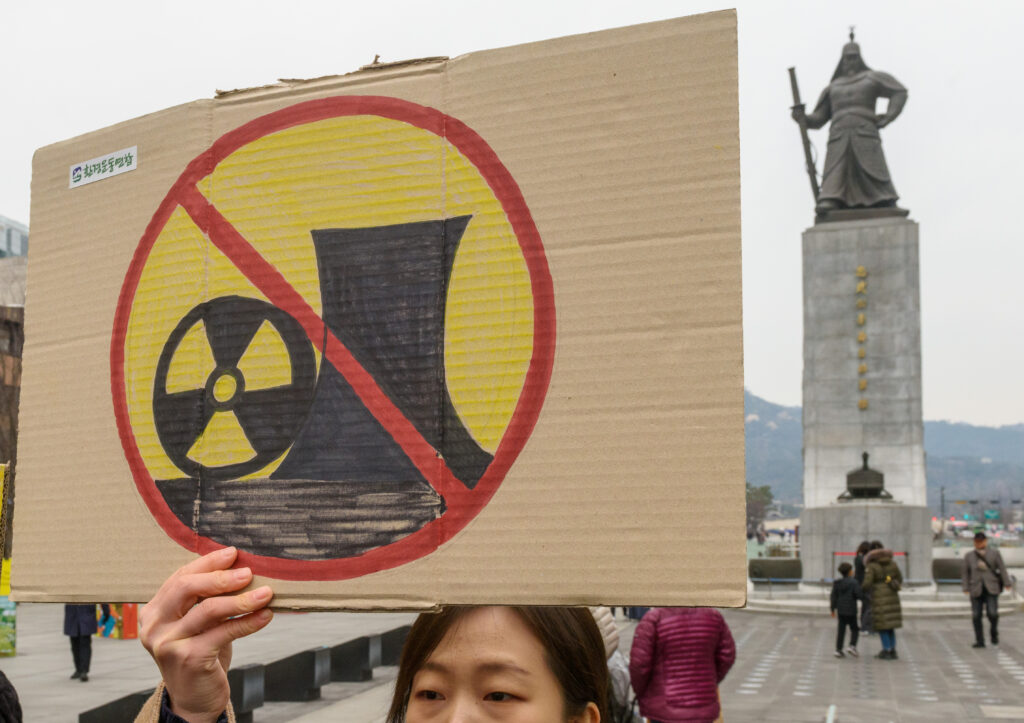Public polls over the past 10 years have consistently shown that more than half of South Koreans want their country to have nuclear weapons. North Korea’s growing nuclear arsenal has made South Koreans want to develop their own nuclear program. Interestingly, this trend has not been affected by US security guarantees.
Even the 2023 Washington Declaration, which was regarded as a significant upgrade in the United States–South Korea alliance’s nuclear extended deterrence, appears to have had little impact. South Korea’s desire for an independent nuclear arsenal is so strong that even US efforts to reassure them cannot dampen it.
The fundamental cause of South Koreans’ desire to go nuclear is their fear of war. This is why it is hard to reassure South Koreans by simply promising more security. The experience of a full-scale invasion of the south during the Korean War continues to have a strong influence on South Korean psychology today. They fixate on the worst-case scenario — another catastrophic war breaking out on the Korean peninsula. The horror of war inflates South Koreans’ feelings of insecurity and drives them to seek the ultimate military weapon that has proven effective in deterring high-level conflicts like nuclear attacks.
It is well known that older generations in South Korea are more supportive of nuclear armament, with a much greater gap between wartime and post-war generations. But because there are so many underlying differences between these two generations, it is inconclusive whether their behavioural differences are caused by wartime trauma.
People who lived through the terrible violence of the Korean War are more fearful of the current North Korean nuclear threats than those who remained relatively safe during the war. They do not want to rely on the US alliance for security and prefer to build up their own military power to defend themselves against external threats. As a result, they are more supportive of the acquisition of nuclear weapons.
Many polls have shown that older men are the most vocal supporters of nuclear weapons. This is because this demographic saw firsthand just how disastrous war can be. People who lived through the Korean War overestimate both the possibility of the peninsula becoming a battleground again and the chances that the United States will abandon South Korea in a security crisis. This is why, even after controlling for the effect of political ideology, their desire to possess nuclear weapons remains unwavering.
Younger people believe war with North Korea is less likely and are less scared when faced with the same level of threat. They have grown up witnessing many North Korean provocations and are comforted by their experience that these provocations never escalated into an all-out war.
The evidence suggests that one possible nuclear non-proliferation strategy in South Korea is to maintain the status quo and wait for the war generation to die off. By 2033, the war generation will make up only 4.2 per cent of the population, down from 2023’s 16.8 per cent. Most of the war generation will be in their 80s by the 2030s, causing a sharp decline compared to the previous decade’s 4.9 per cent point drop.
South Korea elected its first post-war generation president in 2022 and this trend is expected to continue. As the war generation’s influence declines, South Korea will be less determined to develop its own nuclear weapons.
Undoubtedly, South Koreans’ current support for nuclear armament goes beyond just the war generation. But the war generation are the ones who provide unwavering support and their position on nuclear armament is less affected by external factors. Younger cohorts are more likely to strategically alter their views about nuclear weapons in response to the evolving security environment. According to a recent Korea Institute for National Unification report, more than half of respondents withdrew their support for nuclear development after learning about its costs, such as the possibility of economic sanctions on South Korea.
As the war generation declines, South Koreans’ views on nuclear armament will become increasingly contingent on the security environment. This dependence will open up the possibility that US and South Korean policy decisions may be able to somewhat control the South Korean public’s desire for nuclear weapons.
In the long run, the best way to dissuade South Koreans from wanting nuclear weapons is the complete elimination of nuclear threats toward South Korea. Even when those with firsthand Korean War trauma pass away, post-war generations may adopt similar fears through education or personal connections to the war generation. So long as nuclear threats exist, people will continue to be anxious about the possibility of all-out war. Giving South Koreans more security guarantees will not be enough to reassure them.
Denuclearisation of North Korea or the reunification of the peninsula should remain the ultimate goal of non-proliferation in the region. This will be the most effective way to stop South Korea from wanting nuclear weapons, even though it may be a difficult and lengthy process.
James D. Kim is Stanton Nuclear Security Fellow at the Massachusetts Institute of Technology’s Security Studies Program.


South Korea's desire for their own nuclear weapons, driven by fears of war, seems impervious to US security guarantees. This inclination, particularly strong amongst older generations who experienced the Korean War, is anticipated to lessen as war survivors pass away and succeeding, less war-fearing generations grow their political influence. As a result, nuclear non-proliferation policies could potentially become more effective, granted the security environment adapts.